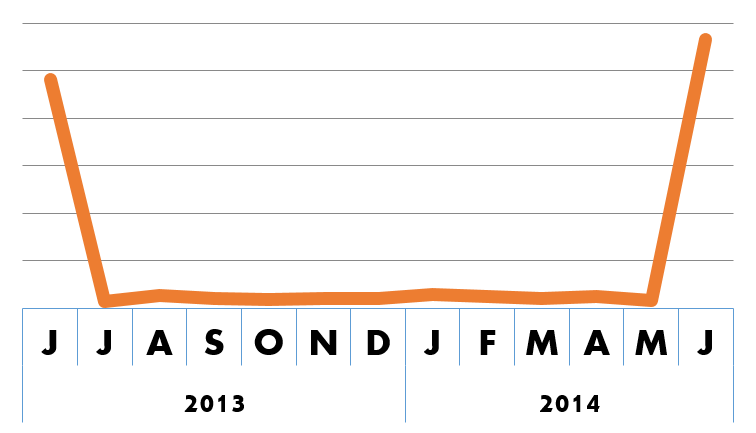It’s true. As Instagram user prettyandfit noted in the motivational poster above, a little change can make a big difference! For example, making small changes in our daily habits can eventually lead to big results! And a simple act of kindness can make someone else’s day (see this list of 35 acts of kindness from a 2000 issue of O, The Oprah Magazine).

Here are some of Oprah’s suggestions for some small, life-altering changes we can make today. Not included on the list, but recommended: take a bubble bath daily.
Nerdily, a single line, like – or /, can change the meaning of a number completely. The addition of the tiny prefixes “un-,“ “dis-,” and “a-“ can change the meaning of a word in a big way, as in “avolition” versus “volition” (<– today’s bonus psychology lesson). A small change in the emphasis of a sentence can change its entire meaning. (The sentence, “I never said she stole my money,” can be interpreted 7 different ways, depending on which word is emphasized!) And… a seemingly minor difference in splicing can change the role of a gene entirely!
Let’s take a look at our Gene-of-the-Week, Krüppel-like factor 6 (KLF6). Drosophila gene Krüppel and its mammalian homologs, Krüppel-like factors (KLFs) 1 through 17, are triple zinc finger DNA binding proteins that can bind three base pairs to regulate gene expression. KLFs modulate cell proliferation, differentiation, migration, inflammation, pluripotency, and apoptosis, and altered KLF function has been associated with a large number of cancers1.
KLF6 is a ubiquitously expressed suppressor of prostate, hepatic, gastric, and other cancers. The mechanisms by which KLF6 can suppress the growth and proliferation of tumors are varied2:
- KLF6 decreases activation of ERK2 (MAPK1) and cyclin D1 (CCND1), necessary for cell viability and tumorigenesis3
- Phosphorylation of KLF6 activates p21 (CDKN1A) and p27 (CDKN1B), which halt the G1 cell cycle4
- KLF6 regulates expression of E-cadherin (CDH1), which among other things suppresses tumor migration5
KLF6 function can be lost via promoter hypermethylation, somatic mutations, and loss of heterozygosity6. Typical. But interestingly, KLF6 function can also be disrupted in a more unexpected way: three splice variants of KLF6 (KLF6-SV1, -SV2, and -SV3) have antagonistic effects on wildtype KLF6 function78. In other words, small alterations in the reading of this gene can lead to opposite functions—small changes can make a big difference! But maybe not in a good way. This alternative splicing is potentiated by hepatocyte growth factor (HGF) phosphorylation, which inactivates splicing regulators SRSF1 and SRSF3. 9

Wild-type KLF6 typically induces cell cycle arrest, including via the induction of CDKN1A, and opposes epithelial–mesenchymal transition (EMT) by activating CDH1 (which encodes E-cadherin), whereas KLF6-SV1 suppresses CDKN1A and CDH1 to enhance tumor progression. Figure from Tetreault et al.10
Variant KLF6-SV1 decreases CDH1 and CDKN1A expression11 and increases expression of cadherin-2 (CDH2) and fibronectin (FN1), which are important for cell proliferation and migration12. KLF6-SV1 can also bind directly to KLF6, inducing rapid ubiquitination of KLF613.
To complicate things, the role of KLF6-SV2 is context-dependent14. In prostate cancer, this variant antagonizes KLF6 and increases proliferation. In hepatocellular carcinoma however, KLF6-SV2 increases CDKN1A expression, decreasing cell proliferation. Srsly complicated! And don’t even get me started on SV3!! (Just kidding, no one really talks about it…)
So, the moral of this week’s post is that small changes can make a difference…. and alternative splicing is really important!
Also, be more like Oprah.

June is National KLF6 Month! Last year, we celebrated the discovery of KLF6 as a novel aryl hydrocarbon receptor DNA binding partner15. This year, we celebrated KLF6’s role as a transcriptional regulator of macrophage polarization16!! The sponsors of this year’s celebration included Dual Therapeutics, a NYC startup that recently raised $7.5 million to develop small molecule therapies to modulate KLF6 and FOXO1 for the suppression of tumor growth and proliferation.
References:
- McConnell B, Yang V. Mammalian Krüppel-like factors in health and diseases. Physiol Rev. 2010;(361):1337-1381. doi:10.1152/physrev.00058.2009.Mammalian. [↩]
- DiFeo A, Martignetti JA, Narla G. The role of KLF6 and its splice variants in cancer therapy. Drug Resist Updat. 2009;12(1-2):1-7. doi:10.1016/j.drup.2008.11.001. [↩]
- Huh SJ, Chen Y-L, Friedman SL, et al. KLF6 Gene and early melanoma development in a collagen I-rich extracellular environment. J Natl Cancer Inst. 2010;102(15):1131-47. doi:10.1093/jnci/djq218. [↩]
- Lang UE, Kocabayoglu P, Cheng GZ, et al. GSK3b phosphorylation of the KLF6 tumor suppressor promotes its transactivation of p21. Oncogene. 2013;32(October 2012):4557-4564. doi:10.1038/onc.2012.457. [↩]
- DiFeo A, Narla G, Camacho-Vanegas O, et al. E-cadherin is a novel transcriptional target of the KLF6 tumor suppressor. Oncogene. 2006;25(44):6026-31. doi:10.1038/sj.onc.1209611. [↩]
- Limame R, Beeck K de, Lardon F. Krüppel-like factors in cancer progression: three fingers on the steering wheel. Oncotarget. 2014;5(1):29-48. Available at: http://www.ncbi.nlm.nih.gov/pmc/articles/PMC3960187/. [↩]
- Narla G, Difeo A, Reeves HL, et al. A germline DNA polymorphism enhances alternative splicing of the KLF6 tumor suppressor gene and is associated with increased prostate cancer risk. Cancer Res. 2005;65(4):1213-22. doi:10.1158/0008-5472.CAN-04-4249. [↩]
- Hatami R, Sieuwerts AM, Izadmehr S, et al. KLF6-SV1 drives breast cancer metastasis and is associated with poor survival. Sci Transl Med. 2013;5(169):169ra12. doi:10.1126/scitranslmed.3004688. [↩]
- Muñoz Ú, Puche JE, Hannivoort R, Lang UE, Cohen-Naftaly M, Friedman SL. Hepatocyte growth factor enhances alternative splicing of the Kruppel-like factor 6 (KLF6) tumor suppressor to promote growth through SRSF1. Mol Cancer Res. 2012;10(9):1216-27. doi:10.1158/1541-7786.MCR-12-0213. [↩]
- Tetreault M-P, Yang Y, Katz JP. Krüppel-like factors in cancer. Nat Rev Cancer. 2013;13(10):701-13. doi:10.1038/nrc3582. [↩]
- DiFeo A, Narla G, Camacho-Vanegas O, et al. E-cadherin is a novel transcriptional target of the KLF6 tumor suppressor. Oncogene. 2006;25(44):6026-31. doi:10.1038/sj.onc.1209611. [↩]
- Hatami R, Sieuwerts AM, Izadmehr S, et al. KLF6-SV1 drives breast cancer metastasis and is associated with poor survival. Sci Transl Med. 2013;5(169):169ra12. doi:10.1126/scitranslmed.3004688. [↩]
- Vetter D, Cohen-Naftaly M, Villanueva A, et al. Enhanced hepatocarcinogenesis in mouse models and human hepatocellular carcinoma by coordinate KLF6 depletion and increased messenger RNA splicing. Hepatology. 2012;56(4):1361-70. doi:10.1002/hep.25810. [↩]
- Hanoun N, Bureau C, Diab T, et al. The SV2 variant of KLF6 is down-regulated in hepatocellular carcinoma and displays anti-proliferative and pro-apoptotic functions. J Hepatol. 2010;53(5):880-8. doi:10.1016/j.jhep.2010.04.038. [↩]
- Wilson S, Joshi A, Elferink C. The tumor suppressor Kruppel-like factor 6 is a novel aryl hydrocarbon receptor DNA binding partner. J Pharmacol Exp Ther. 2013;345(June):419-429. Available at: http://jpet.aspetjournals.org/content/345/3/419.short. [↩]
- Date D, Das R, Narla G, Simon D. Kruppel-like transcription factor 6 regulates inflammatory macrophage polarization. J Biol Chem. 2014;289(15):10319-10329. doi:10.1074/jbc.M113.526749. [↩]


Trackbacks/Pingbacks